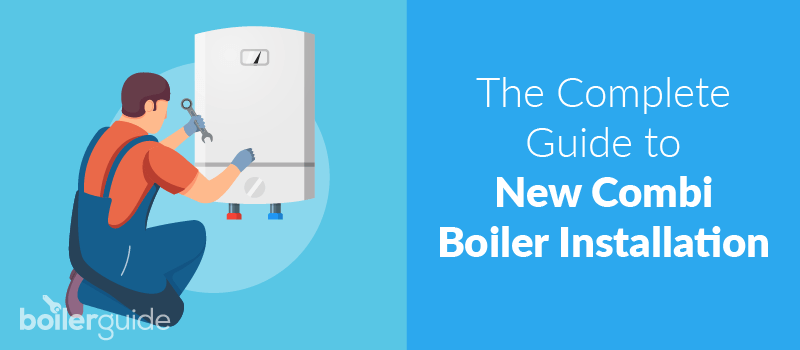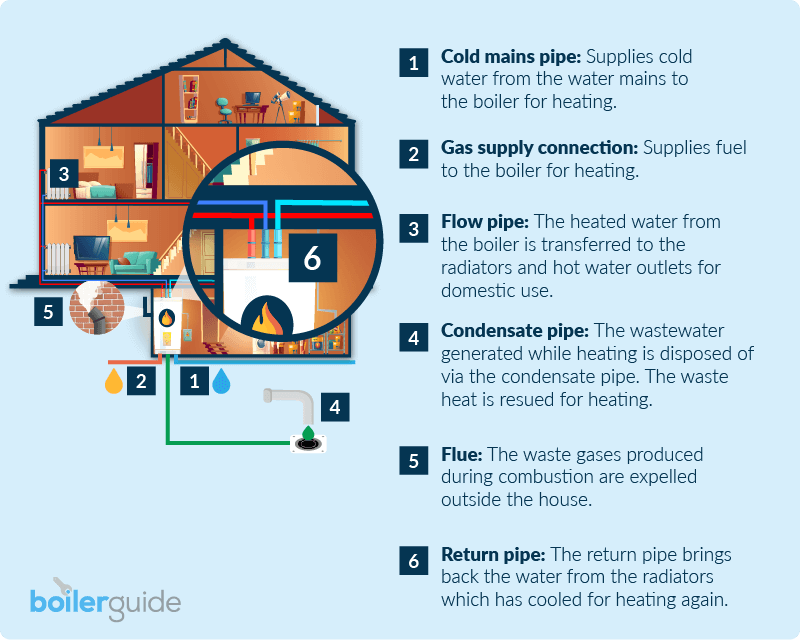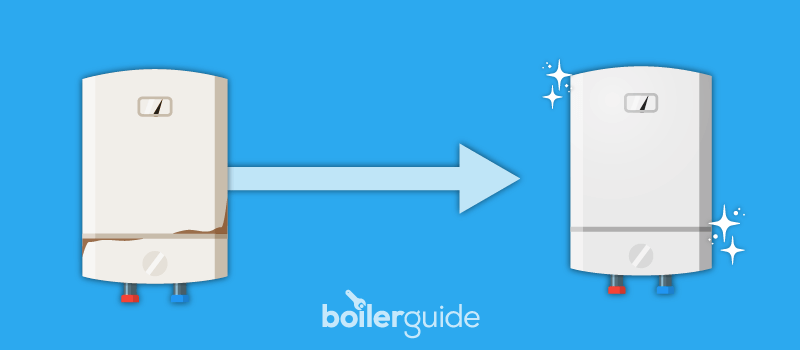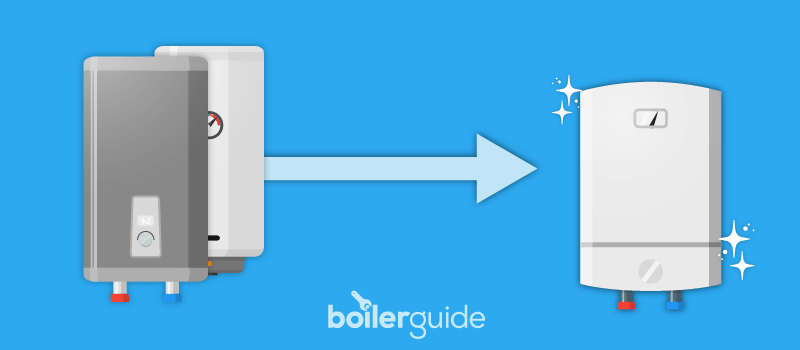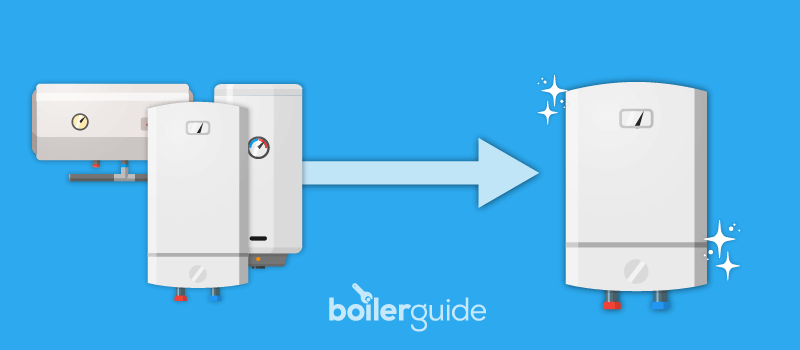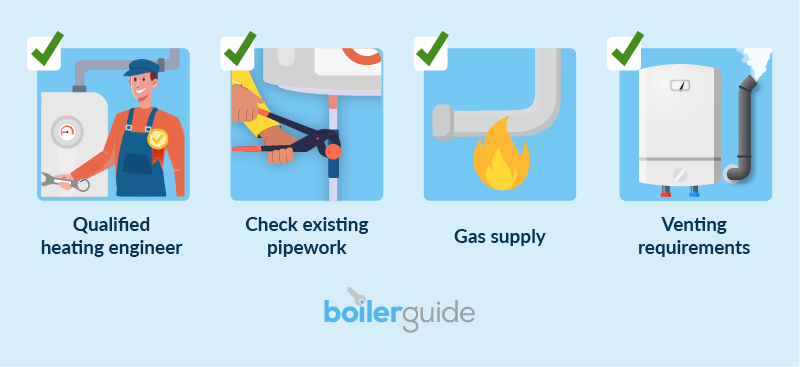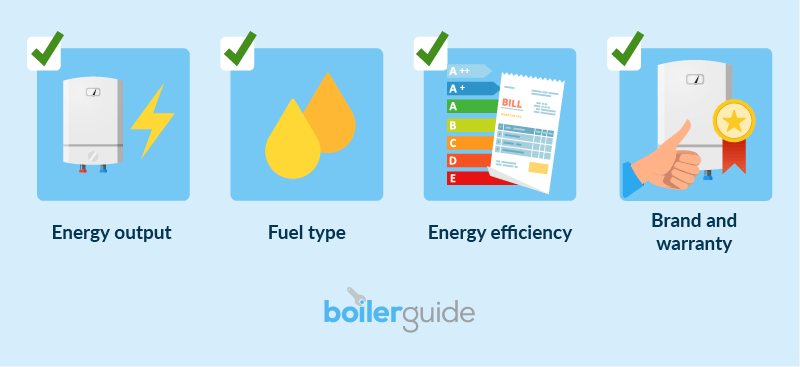Combi Boiler Installation: Costs & Guide (2025)
- What is a combi boiler and what are its advantages?
- How does a combi boiler installation work?
- How long does a combi boiler installation take?
- How disruptive is a new combi boiler installation?
- New combi boiler installation costs
- Why should you get a new combi boiler fitted?
- What to consider when installing a combi boiler
- How to choose a new combi boiler
- Can you DIY a combi boiler installation?
- Find the right combi boiler installer near me
- FAQ
- The average cost of combi boilers in the UK is £3,800, and you can save up to £490 annually on energy bills with an A rated boiler.
- A combi-to-combi installation can be performed within a day, usually taking between 4-6 hours.
- The steps of a combi boiler installation include the removal of the old boiler, a system flush, new boiler mounting, pipework, gas and electrical connections, system commissioning, handover, and registration.
Combi boilers are the most popular heating choice in the UK, with 60%-80% of households opting for these systems. They don't take up much space, and there's no need for any additional tanks or cylinders. This can mean that a new combi boiler installation is generally faster and less disruptive than other boiler types.
This guide will walk you through the combi boiler installation process and related costs. However, if you’ve already made up your mind on what type of boiler to buy but need to find out how much a new boiler costs, you will need an installer you can trust.
However, finding a reliable installer can be time tedious and time consuming. Fortunately, you can use our service to get competitive quotes from trustworthy local installers. All you have to do is fill in our 30-second form to get up to 3 free and non-obligatory boiler quotes. Click below to get started!
Get your best deal
Quickly compare 3 FREE quotes
- Quotes from local engineers
- Get quotes today, installed tomorrow
- Finance options available
- Save up to £500 on installation
- Quotes from local engineers
- Get quotes today, installed tomorrow
- Finance options available
- Save up to £500 on installation

1,8 million quotes provided in 10 years
See more reviews:
What is a combi boiler and what are its advantages?
A combi, also called a combination boiler, provides both central heating and hot water from a single unit. These compact systems are ideal for the heating requirements of small (1-2 bedrooms) to medium sized houses (3-4 bedrooms). Combi boilers guarantee instant hot water and are equipped with advanced technologies such as quiet operation and smart controls.
They have an energy efficiency of 92% to 98% for gas and oil boilers and 99%-100% for electric boilers. They also last for 10-15 years or more with proper maintenance. Additionally, you can save up to £490 a year when replacing an old gas boiler with an A-rated condensing combi boiler.
With high energy efficiency and condensing technology, combi boilers also reduce your carbon footprint by emitting fewer emissions during operation.
How does a combi boiler installation work?
Combi boilers run on many fuels such as gas, oil, LPG and electricity. However, gas boilers are the most commonly installed in the UK, as most houses have a direct connection to the gas grid. Therefore, in our step-by-step installation guide, we’ve focused on how a gas combi boiler is fitted.
The installation process involves connecting the boiler to the gas supply, water pipes, and waste outlet.
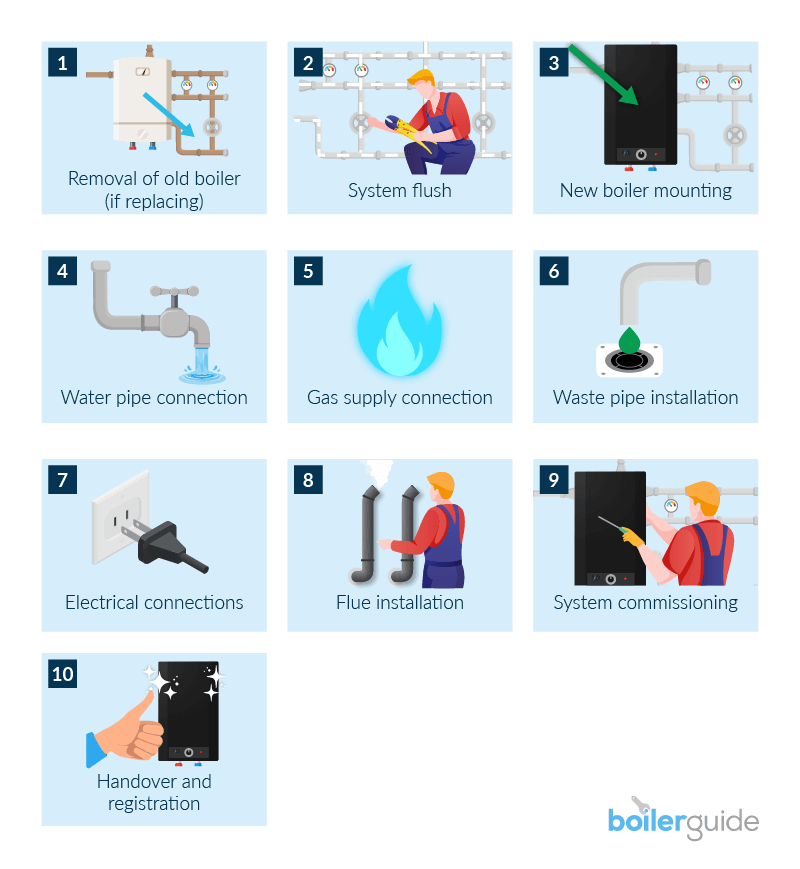
Here's how the gas combi boiler installation works in more detail.
- Removal of old boiler (if replacing): The old boiler and the components that won't be needed for the new boiler are removed.
- System flush: Depending on the condition of the system, either a chemical or a power flush will be performed to clean it. This is important to flush out any debris so that the new boiler can function smoothly.
- New boiler mounting: The new boiler is either installed in the old boiler's location or in a new location. Combi boilers are usually wall-mounted and installed in an airing cupboard, utility room, or kitchen. For stability, a plywood panel may be fixed to the wall first. Once secured, the boiler is hung on metal brackets.
- Water pipe connection: The cold and hot water outlets are connected to the boiler using 22mm piping. The water mains pipe supplies cold water to the boiler, and the flow pipe transfers hot water to radiators and taps. The return pipe brings back the water from the radiators for reheating.
- Gas supply connection: Next, the gas pipe is connected to the boiler for further water heating through a gas valve. The gas will be lit to provide a flame which heats the heat exchanger – bringing the water up to temperature
- Waste pipe installation: The waste (condensate) generated while heating is usually acidic. The waste pipe is installed internally to prevent this corrosive liquid from freezing in cold weather and damaging the system.
- Electrical connections: New electrical cables are connected to the boiler to power sensors, pumps, and control circuits.
- Flue installation: There are different types of flues- concentric, twin, fanned, open and balanced. Depending on the property type and boiler type, the installer will fit the appropriate type of flue. For modern boiler flue installations, two 10-cm-diameter holes are drilled through the exterior wall – one for exhaust and the other for air intake.
- System commissioning: After the installation is done, the heating engineer checks the gas, water, and electricity connections to ensure there are no leaks or issues. They also adjust the system pressure and temperature settings to optimal levels.
- Handover and registration: The final step is the handover, where the engineer explains how the boiler systems work and how to do basic maintenance. Registering the boiler system with the manufacturer is important to ensure the validity of the warranty.
Make sure your boiler is installed by a Gas Safe registered engineer (or OFTEC registered engineer in the case of oil boilers) who can complete the Benchmark checklist. This is a legal requirement for working on gas appliances in the UK.
Combi boiler installation diagram
- Cold mains pipe: Supplies cold water from the water mains to the boiler for heating.
- Gas supply connection: Supplies fuel to the boiler for heating.
- Flow pipe: The heated water from the boiler is transferred to the radiators and hot water outlets for domestic use.
- Condensate pipe: The wastewater generated while heating is disposed of via the condensate pipe. The waste heat is resued for heating.
- Flue: The waste gases produced during combustion are expelled outside the house.
- Return pipe: The return pipe brings back the water from the radiators which has cooled for heating again.
How long does a combi boiler installation take?
The installation of a combi boiler typically takes about 1-2 days, depending on several factors. Expect a straightforward combi-to-combi replacement to be done within 4-6 hours. However, switching from a regular or system boiler requires significant pipework changes and can take up to 2 days.
The labour rates for installation can be £300-£500 a day. When planning the installation time, factor in the boiler's location, whether new radiators will be fitted and the complexity of the overall heating system.
How disruptive is a new combi boiler installation?
There will be temporary interruptions to the water and gas supply when the boiler is installed. This means that there won't be central heating and hot water until the installation is completed. Flue installation and other plumbing might involve some drilling and could be noisy.
New combi boiler installation costs
Combi boiler cost ranges from as little as £600 to £4,000 with an additional £1,000 – £2,000 installation fee. The prices depend on the brand, output size, and fuel type (combi oil boilers tend to be more expensive than combi gas boilers).
| Household size | Boiler energy output | Average boiler unit cost |
|---|---|---|
| Small 1-2 bedroom |
18kW-27kW | £1,100 |
| Medium 3-4 bedroom |
28kW-34kW | £1,800 |
| Large 4+ bedrooms |
35kW-43kW | £2,400 |
The tables below give some averages for combi boiler costs for the most common fuel types.
| Boiler type | Average installation costs | Average costs inc. installation |
|---|---|---|
| Gas | £1,500 | £3,800 |
| Oil | £1,500 | £4,200 |
| Electric | £1,500 | £3,250 |
However, installing a brand-new boiler isn't always the situation. Sometimes your old boiler might just need a boiler replacement, such as switching the fuel type or the boiler type. Therefore, homeowners face different price ranges, which largely depend on the scope of work needed for the replacement.
To get an accurate estimate, we recommend comparing quotes from multiple installers. However, finding and calling up numerous installers can take up hours of your time.
Instead, you can fill out our short 30-second form to receive up to 3 free and non-obligatory quotes from our network of vetted installers.
Click the button below to begin!
Get your best deal
Quickly compare 3 FREE quotes
- Quotes from local engineers
- Get quotes today, installed tomorrow
- Finance options available
- Save up to £500 on installation
- Quotes from local engineers
- Get quotes today, installed tomorrow
- Finance options available
- Save up to £500 on installation

1,8 million quotes provided in 10 years
See more reviews:
Replacing a combi with a combi
The average cost for this kind of boiler swap can be £3,800. Your expenses will be higher or lower depending on the size of your boiler, your fuel choice and whether you're planning on moving a boiler within your home.
| Combi-combi replacement | Average price range |
|---|---|
| New combi boiler | £600-£4,000 |
| Installation costs | £1,000-£2,000 |
If you are considering changing your boiler, the easiest option is a like-for-like replacement. This is because it can require no or minimal changes to the pipework, and no additional components like water cylinders or storage tanks need to be removed. A new combi boiler installation can take 1-2 days.
Replacing a system boiler with a combi
Changing from a system boiler to a combi boiler costs, on average, around £3,250. However, prices may be higher because the installation process is longer than that of swapping an old combi boiler with a new combi boiler.
| System-combi replacement | Average price range |
|---|---|
| New combi boiler | £600-£4,000 |
| System removal | £500 |
| Installation costs | £1000-£2000 |
Fitting a combi boiler to replace a system boiler involves removing the hot water cylinder and potentially adjusting the pipework. This can take about 2 days or more to complete, so you can end up spending more on labour costs.
Changing from a regular boiler to a combi
If you’re switching from a regular boiler, you can expect to pay, on average, £4,600. This kind of replacement is the most costly, as it requires the removal of a feed and expansion tank in the attic as well as a hot water storage cylinder.
| Regular-combi replacement | Average price range |
|---|---|
| New combi boiler | £600-£4,000 |
| Regular boiler removal | £800 |
| Installation costs | £1,000-£2,000 |
The combi boiler gets its water supply directly from the mains, so more pipework will be required. As a result, having a combi boiler fitted to replace a regular boiler can take 2.5 days or more, depending on the complexity of the installation.
The surefire way to find a boiler that suits your requirements is to consult several heating engineers in your area. However, finding an installer you can trust can stretch for days and weeks if done alone.
By filling in our short form, you can receive up to 3 quotes for a brand-new boiler from trustworthy professionals near you. Then, just compare quotes to choose a reliable installer to work with and to find the best deal for your new combi boiler.
Click the button below to begin!
Get your best deal
Quickly compare 3 FREE quotes
- Quotes from local engineers
- Get quotes today, installed tomorrow
- Finance options available
- Save up to £500 on installation
- Quotes from local engineers
- Get quotes today, installed tomorrow
- Finance options available
- Save up to £500 on installation

1,8 million quotes provided in 10 years
See more reviews:
Why should you get a new combi boiler fitted?
Upgrading an old boiler to a new combi unit can drastically improve your home's efficiency and comfort. A modern combi boiler comes with some solid advantages.
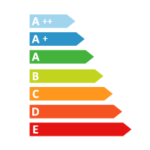 Improved energy efficiency: While gas boilers have an efficiency rating of around 92%-98%, most electric combi boilers can boast ratings as high as 99%-100%. However, this doesn't mean that electric boilers yield more savings as the running costs of electricity are 3 times higher than gas.
Improved energy efficiency: While gas boilers have an efficiency rating of around 92%-98%, most electric combi boilers can boast ratings as high as 99%-100%. However, this doesn't mean that electric boilers yield more savings as the running costs of electricity are 3 times higher than gas. Space-saving design: When compared to regular boilers, combi units are more compact and can even fit into a kitchen cupboard as they don't need separate hot water tanks.
Space-saving design: When compared to regular boilers, combi units are more compact and can even fit into a kitchen cupboard as they don't need separate hot water tanks. On-demand hot water: Combi boilers eliminate the need to heat and store large amounts of water in the tank.
On-demand hot water: Combi boilers eliminate the need to heat and store large amounts of water in the tank. Cost savings: While any central heating installation cost is a hefty investment, a new combi boiler can reduce your bills by £490 per year.
Cost savings: While any central heating installation cost is a hefty investment, a new combi boiler can reduce your bills by £490 per year. Addressing existing issues: If your current heating system constantly breaks down and does not provide enough heating or hot water for the house, a new combi boiler can resolve these issues.
Addressing existing issues: If your current heating system constantly breaks down and does not provide enough heating or hot water for the house, a new combi boiler can resolve these issues.
Apart from those, you can also save on your new combi boiler installation costs (depending on your setup). Combi boilers forgo the need for complex pipework, making them simpler and cheaper to install. If you are looking for a cheap boiler installation, a combi boiler is a cost-effective option.
What to consider when installing a combi boiler
Here's a list of potential considerations you should think about before installing a combi boiler:
- Qualified heating engineer: First and foremost, your installation should be performed by a qualified heating engineer who will comply with relevant building codes and standards. Gas boilers should be installed by a Gas Safe registered installer, and oil boilers should be installed by an OFTEC qualified engineer.
- Check existing pipework: Consult a heating engineer to check whether your existing pipework needs to be adjusted for high pressure (which is needed for combi boilers to operate).
- Gas supply: For a gas combi boiler installation, you may need to update or increase the gas pipe size, as it usually needs to be upgraded to 22mm minimum.
- Venting requirements: Plan for proper exhaust and air intake through an exterior wall.
However, while these points concentrate on the installation process, it's important to factor in the removal of existing system components. For example, if you convert from a regular boiler, you'll need to remove tanks, cylinders, and redundant piping. Remember to consult a qualified engineer regarding your heating project before making any decisions.
How to choose a new combi boiler
There are a couple of things you should keep in mind while choosing a new combi boiler, such as energy efficiency, output size, fuel type, brand and warranty. This section will cover these points in detail:
- Energy output: Depending on the heating requirements of your house (e.g. number of radiators and hot water outlets), pick a boiler with the right energy output. For example, 18kW-27kW is suitable for a small house (1-2 bedrooms), 28kW-34kW for a medium sized house (3-4 bedrooms) and 35kW-43kW for a large house (4+ bedrooms). Picking the right output size is important because if it is too small, it will not be able to meet the heating demand, and if it is too big, it would increase your heating bills unnecessarily.
- Fuel type: Gas boilers are the most common in the UK due to low running costs (6.99 pence/kWh). Oil fired combi boilers (6.8 pence/kWh) are ideal for areas without a connection to the gas grid. Electric boilers have high running costs (27.03 pence/kWh) and are suitable for houses with low heating needs.
- Energy efficiency: Depending on the fuel type, you can get different energy efficiencies for combi boilers. New gas combi boilers have energy efficiencies of 92%-98%. Choosing a highly efficient boiler will help you save money on energy bills, as less fuel is wasted.
- Brand and warranty: The best boilers brands in the UK include Worcester Bosch, Ideal, Baxi and Vaillant. These brands offer good build quality and warranties of 2-12 years. It is recommended to choose a boiler with a long warranty as boilers are a long term investment.
Can you DIY a combi boiler installation?
Unless you are a qualified installer you cannot DIY a boiler installation. Combi boiler installation involves working with the water mains, electrical, plumbing and gas connections.
It is a legal requirement that gas boilers are installed by a qualified engineer to ensure compliance with safety regulations. Improper installation can lead to lethal carbon monoxide poisoning, gas leaks or even an explosion
Find the right combi boiler installer near me
A gas boiler installation has to be carried out by a Gas Safe registered engineer to ensure it meets building and safety regulations. If you need an oil boiler installation, you should find an OFTEC-registered engineer.
Only engineers listed on the Gas Safe register are legally allowed to work with gas appliances. You can check if an engineer is on the Gas Safe register on the Gas Safe website and should always ask to see an engineer’s Gas Safe ID before they begin work in your home. The ID will not only confirm that they are competent but also which types of appliances they are able to work on.
Comparing quotes from multiple engineers is the best way to keep the costs of your new combi boiler installation down and ensure that you're getting top advice. Instead of spending hours looking up the costs of different installers, let us help you get started in just 30 seconds.
Simply fill in our short form and wait for up to 3 engineers in your area to reach out to you with quotes for their services.
Click the button below to get started!
Get your best deal
Quickly compare 3 FREE quotes
- Quotes from local engineers
- Get quotes today, installed tomorrow
- Finance options available
- Save up to £500 on installation
- Quotes from local engineers
- Get quotes today, installed tomorrow
- Finance options available
- Save up to £500 on installation

1,8 million quotes provided in 10 years
See more reviews:
FAQ
Are combi boilers easy to install?
Yes, combi boilers are fairly easy to install and the process can be finalised in about 1-2 days. However, in some cases the installation process will be more complex depending on the kind of combi boiler you choose and what type of boiler swap you require.
Can I install a combi boiler myself?
No. It is a legal requirement to use a qualified engineer who can adhere to safety regulations. Installing your own combi boiler can be dangerous for you and your home. Find a Gas Safe registered engineer to help you.
How long does a combi boiler installation take?
Combi boiler installation can be as quick as 4 – 6 hours, while more extensive heating system replacement can take upwards of 2 days. This timescale can depend on a few factors that may take longer, but generally, they are quick to install.
What happens during a combi boiler installation?
An engineer will come over and look at your home setup, assess the work that needs to be done, and provide you with a quote. Once you agree to a price, they will prepare your home, install it, and show you how to operate it. The process for replacing a system can be different but involves many of the same steps.




